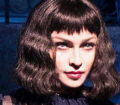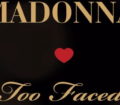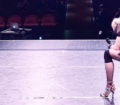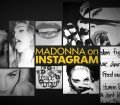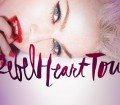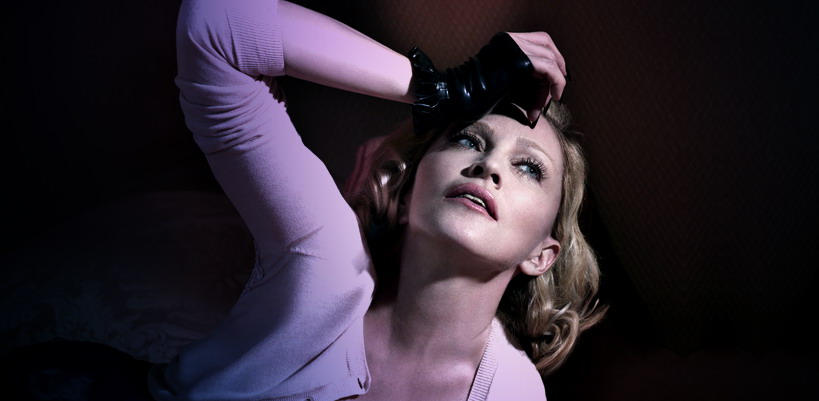
Madonna had an exclusive interview with Brian Hiatt for the Irish Independent and opened up about studying Islam, and why she is an Israelite rather than a Jew.
The article gives us a glimpse of what happened during the Grammy Award rehearsals…
‘She’s coming out,” a choreographer says over a PA system, sounding tense. “Everyone get your horns and masks on.” A couple of nights before the Grammys, 22 shirtless, flawlessly fit male dancers, each equipped with a bejewelled face mask and hazardous-looking black bull’s horns, line up on a rehearsal-studio stage within Sony Pictures’s Culver City lot, awaiting inspection.
Madonna struts out of a dressing room far across the studio, dressed in a matador outfit, sans pants. Trailed by a hairstylist and a make-up artist, she spends at least 30 seconds eyeing each dancer, probing for tiny imperfections in the fit of their leather costumes and masks. “I don’t want oil on their bodies,” she notes. “I had the same problem on the video. You can use body moisturiser.”
Twenty-eight choral singers, most of them less finely sculpted specimens, assemble by the nearby bleachers. Madonna gives them even more individual attention. On their red robes is a logo from her new album, Rebel Heart – a detail even HD cameras will never pick up. She asks the ones who wear glasses if they can take them off; suggests hairstyles and, occasionally, cuts – “The nice thing about hair is that it grows back.” She critiques beards and sideburns; and in one woman’s case, reaches out and begins braiding curls herself.
All of this work is for five minutes’ worth of TV time, the debut performance of her new single, the deep-house-inflected Living for Love. In keeping with the lyric, “Love’s gonna lift me up”, it ends with a prone Madonna soaring 15 feet into the air via a harness. It’s a lovely image, though as she hovers tonight she breaks the spell by asking: “Are my boobs coming out of my costume?”
In between takes, two small children come up to the stage. They’re both nine years old – the boy, David, is in crisp white linen; the girl, Mercy, is wearing a blue sweater and skirt, a sparkly bow in her hair. “Hi, Mom,” they say, in unison, and Madonna smiles, offering a hand for her youngest kids to kiss.
As the downtime stretches on for a few more seconds, she begins to lose patience. “Are we having a break right now?” Madonna asks into her microphone. “Or can we go? I have things I need to do.”
Four days later, Madonna is back in her home on Manhattan’s Upper East Side with Irish Independent’s Brian Hiatt. On the coffee table are his twin digital recorders. Madonna reaches down and lines them up more evenly…
Madonna: I have OCD. What’s your zodiac sign?
Brian Hiatt: Taurus
Madonna: Strong-willed people. They don’t like to change. But very loyal.
[Brian Hiatt laughs a little, but assures Madonna that he’s not sneering at astrology.]
Madonna: Oh, OK, good. You can’t be a human being and laugh at it. Because it’s a science, it really is. I mean, obviously there’s a lot of charlatans. In general, and in specific.
I was doing yoga earlier and I literally fell asleep in corpse pose. But you know, yoga is a preparation for death. Yogis get to a point where they can literally slow their heartbeats down. And then as they get older, they go into the woods, and they sit in their loincloth or whatever it is, and they choose to stop their heart. Anyway, that’s what yoga’s all about. It’s not about twisting yourself into a pretzel. It’s about preparing for death. Detachment from desire. What a great way to start an interview!
Brian Hiatt: I was struck by your extraordinary attention to detail – going over each singer, each dancer. What is that all about for you?
Madonna: I’ve always been that way, and then it’s just developed over the years, as I’ve done more things – especially film directing. I really want to see everything. If it’s around me and it’s part of my show, I need to be a part of all of it. From the creation of the music, to the surface of the floor, to everyone’s hairstyle, to the details with the buttons and the bows and the snaps and the zippers. All of those things! I don’t know where it started, but I think it’s just gotten worse [laughs].
Brian Hiatt: Or better.
Madonna: Or better, yeah. Because I do think that those details matter.
Brian Hiatt: When you’re making a new album, how do you deal with the pressure of living up to your past work?
Madonna: I don’t think about my old stuff. I just move forward. I mean, it’s funny, because when I work with people, they’re referencing other things. Diplo kept wanting to play, like, the bass line for Vogue or something from La Isla Bonita over and over again. I’m like, ‘OK, let’s move on.’ I forget about stuff. I don’t feel like I have to live up to anything. I’m just thinking about what I want to write about.
Brian Hiatt: At the same time, the new song Veni Vidi Vici is very self-referential, even dropping old song titles.
Madonna: Yeah, because every once in a while, it is good to look back and tell a story about how a girl from Detroit came to New York.
Brian Hiatt: I mean, it is an amazing story. Are you able to recognise it now?
Madonna: [Softly] It’s crazy, what’s happened in my life and what I’ve been through. If I really think about it, I’ve had an amazing life. And I’ve met so many amazing people. I saw Nile Rodgers [Like a Prayer producer] at the Grammys, and I just gave him the longest, biggest hug. I feel like I’ve survived so much, and been through so much. And sometimes I miss the innocence of those times. Life was different. New York was different. The music business was different. I miss the simplicity of it, the naivete of everyone around me.
Brian Hiatt: Some people are very invested in the idea of ‘Who’s the Queen of Pop?’ Is that a crown you’re interested in?
Madonna: Well, I do think of myself as a queen, but I don’t think I’m the only queen. There’s room for other queens. We reign over different kingdoms.
Brian Hiatt: Lady Gaga told Howard Stern that there’s a perception out there that she was going for your crown. ‘I don’t want her fucking throne,’ she said.
Madonna: I don’t think she wants my crown, either. We live in a world where people like to pit women against each other. And this is why I love the idea of embracing other females who are doing what I’m doing. It’s important for us to support each other. The only time I ever criticised Lady Gaga was when I felt like she blatantly ripped off one of my songs. It’s got nothing to do with ‘she’s taking my crown’ or ‘she’s in some space of mine.’ She has her thing. I do think she’s a very talented singer and songwriter. It was just that one issue. And everybody’s obviously run with it and turned it into a huge feud, which I think is really boring, quite frankly. And you know what? I don’t care anymore. Here’s the thing: One day, everyone’s going to shut up about it. You’ll see! I have a plan.
Brian Hiatt: Do you keep journals? Do you write poetry that no one reads?
Madonna: Yeah, both. Actually, one of my assistants just found one of my journals from 1991. I’m complaining the same way about not being able to sleep in 1991 as I am right now. Like, some things never change. So that was, in a way, reassuring.
Brian Hiatt: You were saying the same thing in the 1980s. When did the insomnia start?
Madonna: Unconsciously, probably when my mother died. And sleep’s never been an easy thing for me.
Brian Hiatt: So do you live on three hours of sleep a night?
Madonna: If I can get six hours, I can get through the day. But because I want to have a career and also be an attentive mother, I tend to take a lot of breaks and deal with my kids, and then go back to work. In the recording studio, I never finish before 2am, and then I have to get up at 7am for my kids. So there’s a lot of sleep deprivation.
Brian Hiatt: Maybe you’re an advertisement for never sleeping.
Madonna: You start to go crazy if you don’t sleep. But I definitely don’t understand people who sleep 12 hours a day. I see that as the supreme indulgence, people sleeping until noon. How dare they? I never did that when I was a teenager . . .
Brian Hiatt: But you’ve always had goals. You had . . .
Madonna: A fire lit under my ass? Yeah, that’s true. No time to waste.
Brian Hiatt: Some people don’t have as much of a driving purpose.
Madonna: I guess so. Well, I can’t relate to those people.
Brian Hiatt: Did you see the movie Whiplash? [The Oscar-nominated film about a music teacher, played by JK Simmons, who uses bullying and intimidation to drive his pupils to perfection in the school jazz band.]
Madonna: I did, I loved it. I totally connected to it and related to it. I watched it with all my kids, and they were all very mesmerised by it, and I think a little bit speechless afterward. My son David was the most vocal about it, because he’s just the most vocal of all my children. Doesn’t have any agendas. Isn’t going through adolescence. He said: ‘Wow, I want to make my hands bleed.’ When the character said: ‘I’d rather be a 34-year-old genius who did something with his life, dead of a heroin overdose, than live to be 93 and do nothing,’ I totally was like, ‘Yes.’ That really resonated with me. Not, you know, the . . .
Brian Hiatt: Not the self-destructive part.
Madonna: No, no. But believing in yourself and being willing to do anything, to walk through the fire, to do what it is that you want to do. Getting out of that car accident covered with blood to play the gig . . . I mean, that’s me. That’s just me.
Brian Hiatt: But you never had a coach quite like JK Simmons’s character, I would imagine.
Madonna: I’ve had teachers like that, for sure.
Brian Hiatt: There was a dance teacher in high school, Christopher Flynn, who was very important in your life. Was he anything like that?
Madonna: Oh, yeah. He was brutal. He was ruthless, and he walked around with a stick and he hit you with it. He would say kind of outrageous things: ‘Don’t come to my room and stand like that. Get out of here.’ He would not tolerate laziness or complaining. He did a lot of things like that guy in the movie. But when you did something right, he did feed you compliments, once in a while. He’s the one who said to me: ‘You have to get out of this place. You have a gift. Go to New York.’
Brian Hiatt: If you had never gone to that class, would your path have been completely different?
Madonna: Well, things would be very different if lots of other things didn’t happen to me. If my mother didn’t die and I grew up with a feeling of wholeness and completeness and family, I probably would have stayed in Michigan and become a schoolteacher. And I was very blessed to have the teachers that I had. My art teacher, my English-literature teacher, and my Russian-history teacher were also key in the guiding of my artistic soul.
I went through this whole phase where I wanted to be Georgia O’Keeffe. And one day my art teacher came over to me, and she, like, hit me over the head with this rolled-up piece of paper – all my teachers hit me! – and she’s like: ‘You’re terrible! You’re never going to be an artist. You’re a showgirl, get out of here.’
They were kind of my mother figures, as well. Christopher, my ballet teacher, was the first gay man that I met – well, that I knew was gay. He snuck me out when I was in high school to my first gay club, and opened my eyes to a whole world. Not just gay culture, but also just the idea that you could be different.
Brian Hiatt: The ‘rebel heart’ that you sing about, that instinct in you – where do you think it came from?
Madonna: Being a troublemaker? [Laughs] Just growing up in what I considered to be a provincial, suburban, narrow-minded environment. Feeling like I didn’t fit in, feeling ostracised. So if people didn’t accept me at school, I just would push things even further. I thought: ‘Well, you already don’t like me. So fuck you, I’m going to go even further. How do you like these hairy armpits?’
It was just in my DNA. And I didn’t have a mother. That probably had a lot to do with it, because it wasn’t like my mother was saying, ‘You shouldn’t behave that way’. I had a father, I had older brothers. I did have a stepmother, but I didn’t have any relationship with her. So there was no role model for me.
Brian Hiatt: You also saw that your brothers were given freedoms you didn’t have.
Madonna: Yeah. My father was very strict with me, and I kept seeing a disparity between their freedom and my lack of it, or how I had all the responsibilities and they had none. And the Catholic Church, all of the rules, and why did I have to wear a dress when they could wear pants? I would say to my dad: ‘Will Jesus love me less if I wear pants? Am I going to hell?’
I wanted to know why people follow rules blindly, or why girls had to act a certain way and boys didn’t. Why could boys ask girls out and girls not ask guys out? Why did girls have to shave their legs and guys didn’t? Why did society, like, set everything up the way they did? My whole adolescence was full of unanswered whys. Because they never got answered, I just kept lighting fires everywhere – metaphorically speaking.
Brian Hiatt: And then as soon as you were in the public eye . . .
Madonna: Well, that just continued. Because then I was in the public arena of ‘why?’ Because then it was like, ‘Oh, you’re dressing like a slut or a whore, so you must be stupid.’ Or ‘You’re promoting sexuality, so you’re a whore and you’re just doing this for attention. You have no talent.’ Again, I was like, ‘Why? Why can I not be sexual and be intelligent? Why can’t I strut around onstage like Mick Jagger and not be pigeonholed as a bimbo? Why?’ Again.
Brian Hiatt: Or Prince, at the same time.
Madonna: Exactly. Thank you, yes.
Brian Hiatt: You responded the same way you did in high school: ‘You don’t like how I’m dressing – how about this? How about this book?’
Madonna: Same thing. Yeah. My nature is to provoke, that’s true. I can’t help myself. But it’s always with good intentions.
Brian Hiatt: In your 2005 documentary I’m Going to Tell You a Secret, you called your old self ‘an idiot’, which seems pretty harsh.
Madonna: Well, there’s a lot of idiotic things about my old self and my new self. I mean, one’s always being an idiot, let’s face it.
Brian Hiatt: Have you embraced your old self a little more since then?
Madonna: Yeah, maybe. Now I don’t even remember why I called myself an idiot. I can be very harshly critical of myself. It depends on my mood, and obviously it depends on where I am in my life. Yes, embracing myself – I’m working on that [laughs].
Brian Hiatt: Aren’t we all?
Madonna: Aren’t we all. Exactly. Well, some people aren’t. Yeah. Some people are medicating themselves all the time so that they don’t have to embrace themselves. If you can’t feel, you can’t embrace.
Brian Hiatt: Do you still enjoy provocation? Even now?
Madonna: Um, yeah [laughs]. Would you like me to provoke you? I mean, you’re not asking that question because you don’t know the answer, right?
Brian Hiatt: Well, there was a time when you were talking as if you’d left that in the past.
Madonna: Really? Did I say that? I think there probably was a time when I was less provocative. That’s when I was married. Yeah.
Brian Hiatt: I didn’t make that linkage.
Madonna: Yeah, make that linkage (laughs).
Brian Hiatt: What was it about that marriage that made you feel that way?
Madonna: Well, I don’t think my ex-husband approved of it. Or maybe he didn’t understand it. I don’t think he understood my provocation. He was not a fan of me kissing Britney Spears onstage, for instance. Was that provocative? I think it was. I mean, now it wouldn’t be.
Brian Hiatt: On some level, he must have known whom he was marrying.
Madonna: Yeah, but I think all of us make the mistake of thinking we’re going to change people when we get together. But we’re not. People are who they are. And people change in their own time, you know?
Brian Hiatt: During that marriage, you were drinking beer for a while, which is hard to picture.
Madonna: [Laughs] I was, because, you know, when in Rome. And when I lived in England I was embracing all things English, and I went to pubs a lot. If you go to a pub, you better learn to appreciate ale.
Brian Hiatt: How do you balance your own rebelliousness with being a mother who’s trying to get kids . . .
Madonna: To do their homework? Well, I say: ‘You want to change the world? You want to be somebody?’ Rocco looks up to people like Bob Marley. My son David looks up to Michael Jackson. And I say: ‘Being educated is a big part of being a rebel.’ And also discipline, starting a project and finishing through to the end, is key to making something out of your life.
Brian Hiatt: That’s a good argument. Does it work?
Madonna: It does work. And then, of course, the other weapon is: ‘There are kids all over the world who are dying to go to school, who cannot, and here you are complaining about it. Shut up and go to school.’ They go with me to Africa and they see kids going to a school that I built and see how grateful they are to walk to school in their bare feet and sit in a two-room building on very basic chairs and desks. And they see how grateful they are to learn, and it puts everything in check for them.
Brian Hiatt: Years ago, you were asked what kind of mom you thought you would be, and you said, ‘very affectionate, but probably domineering’.
Madonna: What does ‘domineering’ mean, though? Like, bossy? What mother isn’t? I mean, I’m very involved in their lives and very opinionated. But my daughter just went to college, and that’s a lesson in letting go. I can no longer dominate her. She gets to do what she wants to do, and that has helped me become less domineering.
Brian Hiatt: Unlike a lot of other creative people, you seem to lack a self-destructive impulse.
Madonna: Everyone has a self-destructive nature in them. It’s whether you feed it or not. You don’t have to be a pop star to feel connected to destruction or self-destruction. But self-destruction is self-obsession, and self-obsession is not really possible if you’re engaged in raising children. And if you have a spiritual life, you’re constantly being asked to see yourself as one small fragment in the bigger picture. Also, the idea of service to humanity, putting yourself in situations where people have much less than you do, puts life in perspective.
Brian Hiatt: There’s songs on this new record that are spiritual and searching, and other songs that are basically about fucking.
Madonna: You just said a bad word! Are they about that? I don’t know. Maybe you shouldn’t take them so literally.
Brian Hiatt: Fair enough.
Madonna: Would you like to be specific?
Brian Hiatt: Well, there’s the song Sex, for one, and Holy Water, which is about oral sex.
Madonna: But whenever I write about sex, I always do it tongue-in-cheek. That’s the one thing that people misunderstand grossly about me. Holy Water is obviously meant to be funny.
Brian Hiatt: And you do have introspective and sexual songs next to each other on the album, which is interesting.
Madonna: Originally, I wanted to have two records – one was going to be all of my envelope-pushing, mischief-making, provocative music. And then there was going to be the more romantic side of me, the more vulnerable side of me.
Brian Hiatt: You’re showing that you can be spiritually ascendant and also kind of . . .
Madonna: Interested in sex?
Brian Hiatt: Yeah, I guess. But also able to sing about it and be . . .
Madonna: And why not? But once again, I’m defying the convention that you can’t be both, or that you have to be one personality trait. There’s no law that says that you cannot be a spiritual person and a sexual person. In fact, if you have the right consciousness, sex is like a prayer. It can be a divine experience. So why do they have to be disassociated with one another?
Brian Hiatt: If it’s one theme that you and Prince, once again, have in common, it’s that sometime intermingling of . . .
Madonna: Sexuality and . . .
Brian Hiatt: Spirituality, yeah. Like a Prayer – was that a deliberate reference just now?
Madonna: Nope, as I said it, I was like: ‘Oh, I just referenced one of my songs. How perfect.’ I’ve had a teacher I’ve studied Kabbalah with for years, and we have discussions about sex. I also wanted to understand the Koran, and I was studying Islam with an Islamic scholar. And in the Old Testament, in the Koran, sex is not a bad thing.
There are certain religious groups who have turned it into a sinful act. I’ve always tried to open people’s minds to the idea that it’s not something to be ashamed of.
Brian Hiatt: You took a lot of flak for moving the culture to where it is now, for things that no longer seem shocking.
Madonna: Well, think about how crazy everybody went when Truth or Dare came out, and now everybody has a reality show, and nobody thinks twice about it. And I got so much shit for my Sex book, and no one gives Kim Kardashian a hard time. It’s so crazy. So I guess I had to be the scapegoat.
Brian Hiatt: To what extent would you characterise yourself as Jewish? Would that be a good label?
Madonna: [Laughs] No, I don’t affiliate myself with any specific religious group. I connect to different ritualistic aspects of different belief systems, and I see the connecting thread between all religious beliefs. I have not converted to Judaism.
I’ve studied Kabbalah, as you know, for many years, so there are a lot of things I do that one would associate with practising Judaism. I hear the Torah every Saturday. I observe Shabbat. I say certain prayers. My son was bar mitzvahed. So this appears like I’m Jewish, but these rituals are connected to what I describe as the Tree of Life consciousness and have more to do with the idea of being an Israelite, not Jewish.
The tribes of Israel existed before the religion of Judaism existed, so you have to do your history . . . So, am I Jewish? I mean, some people would say, well, you do a lot of things that Jews do, but I would say I do a lot of things that people did before Judaism existed. And I believe what I practice has to do with something deeper than religion, that it embodies all religions, including Judaism. And Christianity. And Islam.
Brian Hiatt: Well, you’re wearing a cross.
Madonna: I like crosses. I’m sentimental about Jesus on the cross. Jesus was a Jew, and also I believe he was a catalyst, and I think he offended people because his message was to love your neighbour as yourself; in other words, no one is better than somebody else. He embraced all people, whether it was a beggar on the street or a prostitute, and he admonished a group of Jews who were not observing the precepts of the Torah. So he rattled a lot of people’s cages.
Brian Hiatt: A rebel heart, you might say.
Madonna: He was a rebel heart for sure.
Brian Hiatt: What do you make of Kanye West, who co-produced three of your new songs?
Madonna: He’s a brilliant madman. He can’t help himself. Like, he doesn’t have the same filters other people have. He has to blurt things out – he’s always saying inappropriate stuff. But he also has brilliant ideas in the studio, if you can get him to pay attention long enough. He would come and go. He would drive me bonkers, because he’s got so many things going on in his life.
And this seemed to be the theme of my record, working with people who can’t get off their phone, can’t stop tweeting, can’t focus and finish a song. It drove me crazy. I was, like, running around with a butterfly net. But I feel like the music business needs him, because everyone’s become so politically correct, so safe. I don’t always agree with the things he says or does – I don’t always like his music, even. But he’s a beautiful mess. I love him.
Brian Hiatt: Do you see yourself in him at all, or an earlier version of yourself?
Madonna: Not really.
Brian Hiatt: You never jumped on stages.
Madonna: Well, I think he takes award shows too seriously. I never got too engaged with who wins awards or not, because I don’t honestly think it’s that important. So that part of him I can’t relate to. Like, what’s the point of fighting for somebody to . . . like, ‘This person should have got it’? Don’t come to an award show looking for justice!
Brian Hiatt: You hung out with Taylor Swift at the Grammys – it occurred to me that by being sort of the anti-Madonna, she might be most like you. Your bellybutton was a big deal in the 1980s, and her thing was never showing hers.
Madonna: On purpose? I wasn’t aware of that. She has an opinion, and she’s going against the norm. So in that respect, she is similar to me, yeah. And also, people just want to give her a hard time all the time because they think she’s a goody-two-shoes, so of course I want to embrace her.
Brian Hiatt: In some ways, any young female pop star can be seen as a sort of funhouse-mirror version of you. How do you process all that in your head?
Madonna: There’s a part of me that feels jealous, like, ‘Oh, it’s so much easier now to be famous,’ or, ‘It’s so much easier to get your stuff out there.’ But on the other hand, it’s also harder, because you don’t get a chance to find out who you are as a performer without a huge audience. In my coming-of-age time, there was no internet, no social networking, nothing. It was just show after show, hoping one day somebody would notice you.
All of that time you put in develops you, and you’re doing it anonymously. And that’s really helpful, not only to your growth as an artist but also to your psyche, to your confidence about who you are. To be judged and be picked apart by the public when you’re 18 years old, I don’t envy those girls. It’s too much.
Brian Hiatt: On the flip side, it seems one of the only acceptable prejudices in pop writing, and in the world at large, is ageism.
Madonna: It’s the last great frontier, you know? We’ve fought the civil rights movement, we fought for gay rights. There’s so much political correctness, where people would never dream of thinking of judging somebody because they’re gay or because they’re black or because they’re Muslim or whatever. But it’s still the one area where you can totally discriminate against somebody and talk shit, because of their age. Only females, though. Not males. So in that respect, we still live in a very sexist society.
Brian Hiatt: People tend to admire the physical efforts of Jagger and Springsteen – but it’s different for you. That could be seen as a blatant double standard.
Madonna: Yes, it’s extremely blatant.
Brian Hiatt: So do you just ignore it? How do you deal with it?
Madonna: I don’t ignore it. I take note. I think: “That’s interesting.” No one would dare to say a degrading remark on Instagram about someone being black or gay, but my age? Anybody and everybody would say something degrading to me. And I always think to myself: ‘What’s the difference between that and racism, or any discrimination? They’re judging me by my age. Why is that acceptable?’ I don’t understand. I’m trying to get my head around it. Because women, generally, when they reach a certain age, have accepted that they’re not allowed to behave a certain way. But I don’t follow the rules. I never did, and I’m not going to start.
Brian Hiatt: So when, for example, your ass is out on the red carpet – is that deliberately flaunting the idea of what someone . . .
Madonna: Yeah. ‘This is what a 56-year-old ass looks like, motherfuckers.’
Brian Hiatt: Well, I mean, that’s what yours looks like. Perhaps not the average . . .
Madonna: Well, you know what? It could be the average one day. That’s the thing. When I did my Sex book, it wasn’t the average. When I performed Like a Virgin on the MTV Awards and my dress went up and my ass was showing, it was considered a total scandal. It was never the average, and now it’s the average.
When I did Truth or Dare and the cameras followed me around, it was not the average. So if I have to be the person who opens the door for women to believe and understand and embrace the idea that they can be sexual and look good and be as relevant in their 50s or their 60s as they were in their 20s, then so be it.
Brian Hiatt: In the lyrics of Joan of Arc, you say: ‘Each time they take a photograph/I lose a part I can’t get back,’ which sounds more like Sean Penn’s old attitude to the press.
Madonna: There are certain mystical belief systems that believe that taking pictures takes an aspect of the soul, but beyond that it’s just the idea that once you’re captured in a photograph, then a million presumptions are made of you, and you are forever frozen in that one moment, and you are perceived to be the embodiment of that moment, and that, of course, is an illusion.
Brian Hiatt: And sometimes that moment ends up talking back to you, like in Birdman, I guess.
Madonna: Yes. [Laughs] Exactly. It’s a paradox. I love being photographed, or I should say I love the art of photography. It’s about people taking photographs of you, stealing them, and then presuming or assuming or captioning. Words can never be taken back, photographs can never be taken back, nothing can ever be taken back.
Brian Hiatt: Do you think about mortality?
Madonna: In some respects I will never die. Because art is immortal. What we leave behind and what we create – the energy that we put out into the world is eternal. The physical body is assembled just like a chair or a building or a flower, but the revolutions we start, the people we affect and inspire, that is eternal. So, in that respect, we do achieve immortality, and that makes me less fearful.
Brian Hiatt: What do you want the next five or 10 years of your life to look like?
Madonna: I want to keep growing and living life to the fullest for as long as I’m on this planet. I don’t have a specific plan. I want to be a good mother, I want my children to thrive. I want to continue to grow as an artist. I hope I will always have the ability to create art and live in a world where I can speak freely, and I can inspire people. I don’t know what form that will take.
Brian Hiatt: Are you open to falling in love again?
Madonna: Definitely. Yeah.
Brian Hiatt: That was a fast answer.
Madonna: I don’t doubt love for a second. I’m living for love, baby. Come on, listen to my songs!
Madame X is available in Box Set, CD, Vinyl and Cassette!
Get your copy HERE!
